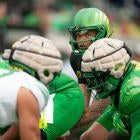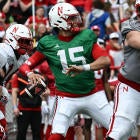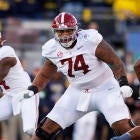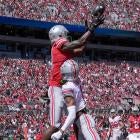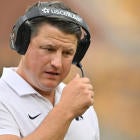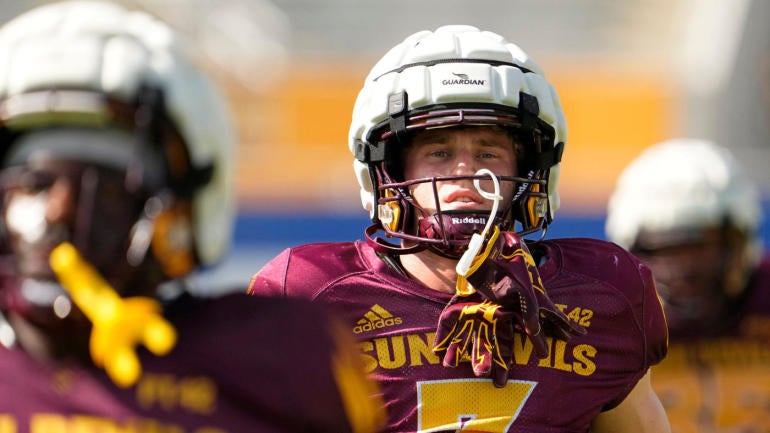
Jake Smith was born a year too soon to enjoy ultimate college football freedom.
The Arizona State redshirt senior wide receiver is at his third school having transferred from both Texas and USC. He hasn't seen the field since 2020 -- first suffering a foot injury, then undergoing surgery before being denied a waiver appeal to play for the Sun Devils last season.
Tuesday marks the beginning of a new era for both Smith and college football. As the spring transfer portal window opens, players are allowed to transfer more than once without restriction thanks to a U.S. District Court injunction issued in December that blocks the NCAA from enforcing its rules against multi-time transfers.
"It's hard to put into words. I can't wait, really," Smith said of the prospect of playing again.
Entering his sixth season, Smith, 23, knows there'd be no transfer issue if he were slightly younger; he would have been eligible last season. After all the legal wrangling and waiver appeals -- be they for injury, mental health, proximity to grandma, etc. -- there is unlimited freedom, at least for this semester. Smith is not the only one wishing transfer rules had been relaxed sooner.
Experts are predicting a flood of players entering the portal Tuesday for reasons that could range from being upset at playing time to hating the color of the wallpaper in their dorm room. They can change schools on a whim without roadblocks. For the first time, it's totally up to them.
As the enterprise moves away from the educational component of college athletics, the question must be asked: What thread of academics tied to athletics will be left? Are players moving closer to majoring in football? We're not necessarily talking about a degree program -- although, who knows, maybe that's in the cards -- but eroding academic integrity in this transfer climate.
Athletes will continue to play. They will go to classes. But does it even matter anymore if they graduate?
"Quite frankly, they don't care," one Power Four AD said non-specifically. "They care, but [athlete] mobility and money is more important than graduation right now."
It's a long-proven fact that the more a student transfers, the less likely that person is to graduate. The NCAA has leaned into that philosophy for years while denying transfer freedom. Now, the courts have forced a change in that philosophy whether anyone likes it or not. A player's freedom and ability to earn money has become more important than the NCAA's stated purpose: that athletics should be part of the educational experience, not the means to an end.
"That's the part you have to look at," Arizona State coach Kenny Dillingham said. "That's the hard part. With the current rules, you [still] have to stay academically eligible."
That philosophy is gone -- at least for the 2024 spring semester. Maybe it'll be gone forever.
The NCAA has promised not to retaliate against athletes who transfer multiple times should the rules revert back to previous form. There were 2,611 football players (roughly 23% of FBS scholarship players) in the transfer portal during the fall semester. Expect numbers like that to be the norm going forward.
"I wonder if we'll ever see transfer waivers again," said Dave Ridpath, an Ohio University professor and college athletics reformer.
The NCAA requires Division I athletes to pass six credit hours per semester to remain eligible for the following term. Standards mandate that players have 40% of their degree course work completed by the end of their second year, 60% by their third year and 80% of major credits completed by the end of their junior year. Shortfalls are typically made up during summer school.
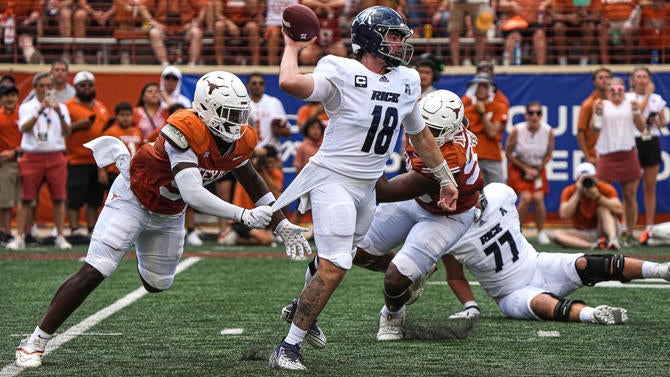
Eligibility doesn't necessarily equal a degree. A large portion of credits don't transfer. Former college quarterback JT Daniels told CBS Sports in January that 60-70% of his credits didn't transfer during his unique journey that included four schools over six years. Complicating matters is that the credit transfer process itself is at the discretion of individual schools.
"I think we'll be making the jobs for academic advisors even more challenging," Shannon said.
Progress-toward-a-degree requirements are expected to be strengthened this week by the NCAA Council. As will other minimum eligibility standards. But that might be like commanding a dog to "stay" while at the same time turning off your pet's geo fence.
"I don't think the NCAA has the appetite for trying to get in a university's academic decisions and business," said Josh Lens, an Arkansas assistant professor and lawyer with vast experience in compliance issues. "They want to leave that alone. That's just one more reason when the portal opens there is going to be so much movement."
Smith's troubles began two years ago when he sought the second transfer of this career from USC to Arizona State. After catching six touchdown passes at Texas in 2019, Smith injured his foot. After transferring to USC, the school would not medically clear him to play. A medical waiver while at Arizona State was turned down shortly before the 2023 season.
According to the family, there really was no explanation. Smith spent the entire 2023 season for Arizona State on the scout team.
"I think it was a punitive action. It was a punishment and it was making an example of them to deter future behaviors," Jake's mother Tina Smith said of the NCAA. "Now those future behaviors are completely allowed and acceptable."
You can understand her frustration. During the process, NCAA president Charlie Baker remarked that similar circumstances affected "less than 1% of all transfers."
"First of all, if it's less than 1%, what's the problem?," Tina Smith said. "Second of all, they're still people."
Smith's case might not be close to the most compelling to look back on during this time of transition. We're at this point, in part, because West Virginia guard RaeQuan Battle sued the NCAA last year alleging violation of antitrust. The association had denied his waiver appeal despite what appeared to be significant mental health issues. Battle was eventually allowed to play last season.
Each year, the association crows about its rising graduation rates. Now more than ever, at the highest level, the college experience will merely be a platform to satisfy those whims. The courts are chipping away at the degree-first philosophy simply because it has become harder to reach that graduation goal.
"When we look back five years from now, what will our graduation rates be?" wondered one member of an NCAA committee dealing with the eligibility component.
It's hard to envision graduation rates being higher in the future. Last year, FBS players graduated at a rate of 82%. That's up from 63% 20 years ago. That's also fifth out of 18 sports in 2023 tracked by the NCAA. (Athletes are given six years to complete four years of eligibility in this annual study.)
While critics bemoan an age of pay-for-play, the current environment may be nothing more than an evolution toward a compensation model. A path of least resistance toward eligibility has long been established. The NCAA permanently did away with pre-enrollment testing (SAT/ACT) to determine initial eligibility last year. Check through any Power Four media guide, and you'll find the usual groupings of kinesiology and liberal studies majors.
Even before a time where easier transfer routes existed, the academic stressors included transferring the bulk of those credits.
Smith said "35-40%" of his credits didn't transfer as he matriculated from Texas to USC and then to Arizona State. Again, it's entirely up to the individual school what credits to accept, which frequently leads players to pursue majors that align with football.
"That almost became a magical thing," Ridpath said. "You have an educational choice in that. It's somebody finding you a major. That's where you usually find someone is going to be put in general studies or a major is going to be created."
Classes are already commonly organized not to conflict with practice time. In a worse case, some continue to assert -- in an infractions case that resonates seven years later -- North Carolina enabled academic fraud for almost two decades.
"If you get a full, free education to play football, football is part of the agreement you're signing to, no matter [if] it conflicted with practice," Daniels said of football's impact on academics. "That's kind of a pipe dream."
A Prime example, pun intended, is Colorado relaxing its transfer rules upon Deion Sanders' arrival. Though the school stressed the policy change was a move intended to benefit all students, it was football that benefited most.
Sanders' roster flip was considered the most significant in the short history of the transfer portal. Under the new relaxed standards last academic year 51 athletes transferred to Colorado and enrolled -- 41 of them football players. Among the rest of the student body, 49 transfers enrolled. That's among a total undergraduate transfer population of 1,500.
"At Colorado, they made a decision collectively that, 'OK, we're going to try to couch this as a benefit to all students,' Ridpath said. "But Colorado has tried to make itself out to be a public Ivy. Yet, here they are altering their transfer standards to get in transfer players Deion Sanders wants.
"It's not a horrible thing, but it's just another sleight of hand. Just be honest about it."
How is that any different than the average student transferring as many times as they want in search of the ideal college experience? The NCAA has preached for years that the student-athlete experience should be as close to the normal student as possible, right?
Eligibility doesn't necessarily lead to graduating, however. And there's a difference between getting a degree and getting a quality education.
"We're not going to cherry pick between what a good degree is and another," said Texas Tech faculty athletics rep Brian Shannon. "Athletes should have those choices. Are all these transfers motivated by something other than academic reasons? I think we know that [they are]."
Daniels might be the exception going forward. He was a top student coming out of the acclaimed Mater Dei High School near San Diego, and he actually wrote -- and won -- his own waiver appeal when transferring a second time from USC to Georgia. He earned a psychology degree from Georgia and is currently on an MBA track at Rice after medically retiring from football last year.
It should be noted, both Daniels and Smith have remained high-achieving students during their respective journeys. Smith said he is in liberal studies at Arizona State after starting in Texas' communications school studying advertising.
The issue is that those old NCAA transfer rules were organized around academic concepts but are now being shaped by the courts. The old year-in-residence transfer rule dated back to 1964 before legal pressure forced the transfer portal's creation in 2018. The current injunction may prove to be one of the most significant rulings in NCAA history along the lines of Alston v NCAA.
It has now become much easier to assemble and retain a roster in professional sports than in college athletics. In the pros, there are salary caps and team budgets.
In major college sports, pure chaos continues to reign.
"At least when you sign a contract, you sign a contract … and you're there or you don't work. It's one or the other," Iowa coach Kirk Ferentz said of the NFL. "I don't know how we get there in college football or college athletics, but it would be nice to have some clarity and already know, 'Hey, this is what it's going to be this year.' "
Any complaints by coaches lose their impact when coaches are enabling roster uncertainty to create certainty on their rosters. Freedom goes both ways. Freshman All-America offensive tackle Kadyn Proctor became the up-to-date face of the portal when he announced a transfer from Alabama to Iowa on Jan. 17. Two months later, word leaked that Proctor was going back to Alabama.
He is among those in the portal after its window opened Tuesday. Meanwhile, it's assumed that Alabama's projected starting left tackle is currently enrolled at Iowa.
"I'm not sure about his whereabouts right now," Ferentz said.
See? Chaos.
One of the mysteries of the transfer portal era is how these guys and girls are staying eligible. It would be worth the price of admission to view the transcripts of any multi-transfer athlete. Or should we even care in a NCAA world that values NIL and transfer freedom over academics -- whether anyone likes it or not.
"Typically, we don't enforce policies that force loyalty," Daniels said. "We want loyalty to be organic and natural. We want people to be loyal to people they choose to be loyal to. When you limit the ability to exercise your freedoms of transferring, there needs to be a very valid reason to do so. And to just blatantly enforce loyalty, I think it's hard to argue that case."
Tina Smith is simply glad to have her son home in Scottsdale, Arizona, where Jake played locally at prestigious Notre Dame Prep.
"I value formal education, and I understand concerns about lost credits; that's a real thing," she said. "But these young adults should be allowed to consider all factors and make their own decisions based on their well-being and best interests, especially in the realities of this new college football world."














